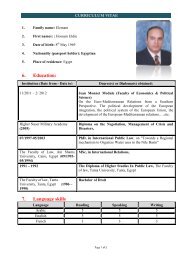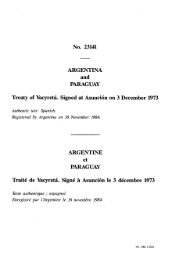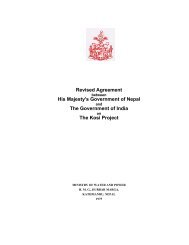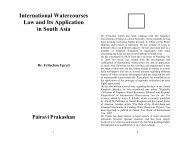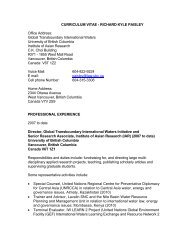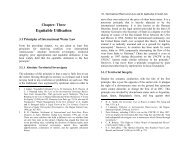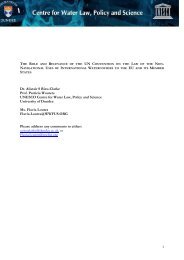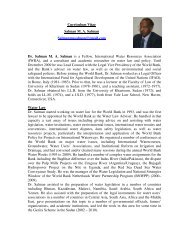Upreti, Trilochan, International Watercourses Law and Its Application ...
Upreti, Trilochan, International Watercourses Law and Its Application ...
Upreti, Trilochan, International Watercourses Law and Its Application ...
Create successful ePaper yourself
Turn your PDF publications into a flip-book with our unique Google optimized e-Paper software.
70 / <strong>International</strong> <strong>Watercourses</strong> <strong>Law</strong> <strong>and</strong> <strong>Its</strong> <strong>Application</strong> in South Asia Development <strong>and</strong> Codification of <strong>International</strong> <strong>Watercourses</strong> <strong>Law</strong> / 71the treaty provisions. 129 Furthermore, it furnishes a uniqueexample of cooperation between Thail<strong>and</strong> <strong>and</strong> Laos, in whichthe former is guaranteed not only purchase of electricity to begenerated by the latter, <strong>and</strong> a sovereign guarantee to theinternational capital market <strong>and</strong> banks to provide loan money todevelop the Laotian projects. 1302.7.12 Treaty on Sharing of the Ganges Waters atFarakka, 1996 India-BangladeshThe Treaty, which replaced the earlier 1977 treaty, has beeninstrumental in resolving the outst<strong>and</strong>ing <strong>and</strong> chronic disputeover the Ganges water in an equitable <strong>and</strong> reasonable manner,which reconciles their mutual interests. 131 The main features ofthe said arrangement are as follows:The quantum of waters released by India to Bangladesh will beat Farakka. Both governments will be entitled to a 50% of share(without any prejudice to the existing uses of eachgovernment). Minimum flows to both states during the dryseason are guaranteed a prescribed quantum. Arrangement of ajoint Technical Committee <strong>and</strong> a Joint River Commission hasbeen made in order to execute the provisions of the Treaty (inequal representation by both governments). Very long,contentious <strong>and</strong> complex conflicts between the two neighbourshave been resolved. However, there is still some dissatisfactionfrom the Bangladesh side over the allocation of water,particularly in the dry season: in the event of unexpectedlydiminished flow, there is no provision to regulate it, as it had129 S. M. A. Salman & L. B. De Chzournes (eds), “Conclusion” in<strong>International</strong> <strong>Watercourses</strong>: Enhancing Cooperation <strong>and</strong> ManagementConflict, Washington DC: The World Bank Technical Paper No 414,The World Bank, 1998, p. 170.130 P. Chomchai, “Management of Transboundary Water Resources: ACase study of the Mekong” in M. I. Glassner (ed), The United Nationsat Work, Westport CT: Praeger, 1998, pp 245-255; also seewww.mrcmekong.org131 Supra note 126, pp. 519-527.been set out in the previous agreement of 1977. Moreover,India also agreed to a plan to construct a Ganges Barrage 20 kminside of Bangladesh territory to hold up the floodwaters fordry season use. This was previously refused by India statingthat the back up of water would be detrimental. This was amajor breakthrough achieved by this treaty. 132 The maincharacteristics are based on equitable sharing of waterresources <strong>and</strong> adoption of no harm to either state in using thewaters of their common rivers.2.8 The Impact of Water Issues on BilateralRelationsFrom the state practice explained above, it is clear that watersharing <strong>and</strong> allocation issues have profoundly influenced thebilateral relations of states <strong>and</strong> also inter-state relations within afederal set up. 133 Water matters directly influence the relationof Egypt with her upper-riparian states. In south Asia, India'srelations with Bangladesh, Bhutan <strong>and</strong> Nepal are largelyinfluenced by water 134 issues. In North America, relationsbetween Canada <strong>and</strong> USA, <strong>and</strong> USA <strong>and</strong> Mexico areinfluenced by water. Water has been described as the oil of the21 st century <strong>and</strong> it is predicted that if the problem of watersharing <strong>and</strong> allocation is not sorted out in a timely way, asargued by several authors, a third world war is inevitable. 135 Asdescribed earlier, in the water dispute between Arizona <strong>and</strong>132 S. M.A. Salman, “Sharing the Ganges Waters Between India <strong>and</strong>Bangladesh: An Analysis of the 1996 Treaty” in S. M. A. Salman &L. B. De Chzournes (eds), <strong>International</strong> <strong>Watercourses</strong> : EnhancingCooperation <strong>and</strong> Management Conflict, Washington D.C: The WorldBank Technical Paper No 414, The World Bank, 1998, pp. 143-151.133 A. Utton, "In search of an Integrating Principle for Inter-State Water<strong>Law</strong>: Regulation versus Market Place" (1985) in 25 NRJ, p. 992.134 T. <strong>Upreti</strong>, “The Perspective on Downstream Benefits" the Kathm<strong>and</strong>uPost, 24 June 2000, p. 6.135 Http//www.worldbank.org/; Lecture by J. Wolfensohn in November11, 1999. The RAF Penrose Memorial Lecture at the AmericanPhilosophical Society, Philadelphia.



